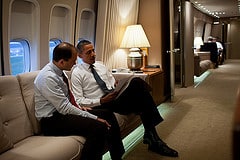photo: U.S. Embassy Jakarta, Indonesia
Everyone is wondering who is Ben Rhodes, a 30-something who ascended from literally nowhere to be what seems a main driving force behind Obama’s foreign policy. He is credited with convincing the president to embrace the Arab Spring, convincing the president to bomb Libya, and, now, convincing the president to start yet another war, this time against Syria.
Who is he? How did a 24-year old aspiring fiction-writer in 2002 suddenly become one of the drafters of not only the 9/11 Commission report but also the Iraq Study Group Report? Then move on to Obama’s presidential campaign as a speechwriter and then to Deputy National Security Advisor, from where he announced the beginning of a US war on Syria while the president met with supporters in the East Room of the White House? Those familiar with Washington know that such miraculous ascents rarely happen on their own and are equally rarely the result of pure, raw talent.
There might be some clues to his brother David’s also improbable rise — from a lowly production assistant at Fox News at the end of the 1990s to covering presidential elections for Fox News (including the one where his brother was writing Obama’s speeches) to the lofty position of president of CBS news by 2011!
The excellent Russ Baker was wondering about all this way back in March, when he noticed a typical New York Times gloss-over article on Rhodes.
Aside from his quite unbelievable rise, we do know that he was catastrophically wrong on Libya, where a Time Magazine article pointed out at the time that he was the strong counter-weight to those who argued for more caution on the use of force.
Here is how Time put it back in 2011, when the interventionists were on the verge of their triumph:
Obama and his aides know they are taking a big risk. “It’s a huge gamble,” says the senior administration official. The administration knows, for example, that al Qaeda, which has active cells in Libya, will try to exploit the power vacuum that will come with a weak or ousted Gaddafi. They also know that the U.S. will have to rely on other countries for the crucial task of rebuilding Libya and that the region may in fact be further destabilized by intervention. Outweighing that, the National Security Council’s Ben Rhodes says, are the long-term benefits of saving lives, protecting the possibility of democratic change elsewhere in the region and—tellingly—ensuring “the ability of collective action to be a tool in circumstances like this.”
Rhodes carried the day on Libya and he was completely incorrect in his assessment, his analysis, his prediction, and his prescription. Anyone who bothers to look at Libya today, which is run by gangs of roving extremist death squads would see what a fool Ben Rhodes is for his promise of “democratic change” in Libya — and how much more foolish is the president for following the advice of such a person.
Rhodes is named as the source of the White House-altered CIA talking points on Benghazi, where references to the Islamist extremist role in the attack on US Ambassador Chris Stevens were erased. It is understandable why the fiction writer Rhodes would want to toss that reference in the circular file: that particular sub-plot did not fit in with the main theme he had already painstakingly written, namely that the US attack on Libya would end the killing, stabilize the country, and bring about a democratic revolution that would continue to spread through the region. Fiction writers understand that a sub-plot could take your readers too far off the main narrative of the story and cause serious structural problems. That is why there are so many rounds of re-writes. The killing of Stevens and the rise of murderous — and racist — extremists did not fit the plot, so it had to be deleted.
Being wrong on war when you are on the sending end of death and destruction is less obvious to your countrymen than when you are on the receiving end. But anyone living in Libya after Rhodes’ “life-saving” mission knows full well the kind of liberation that comes at the tip of a US missile. And neighboring countries know as well what happens when a nation armed to the teeth with weapons, including chemical weapons, completely implodes after its infrastructure is destroyed by foreign attack.
In Washington, though, being catastrophically wrong on Libya eminently qualifies Ben Rhodes to take the lead on US Syria policy.

